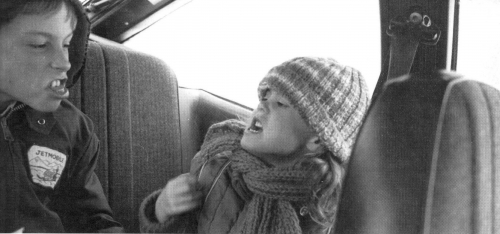
The new neighbors were hidden from view by the spruce that covered the rise separating our properties. From behind the trees came the buzzing of saws, and the banging of nails. Through my kitchen window I watched their truck struggling up the steep incline toward the building site, weighted with lumber and gyp rock. Sometimes I watched them walking on the road. A man, a woman, a kid, a dog.
In good weather it had been my habit to bring my morning coffee to the front door, lean up against the jamb with my dog, Moses, and face east into the sun. Ever since I came here I had had this stretch of road to myself. My Cape Breton farmhouse with the spruce behind me and in front, open fields sloping down to the St. Lawrence Seaway. There had always been nothing else. And that’s the way I wanted it to be.
I began taking my coffee to the back of the house. I sat in the shade and waited for the sun and wished that the new neighbors would drop dead. I put a curtain up on the bathroom window. I started to wear clothes.
Where was the mind big enough to accommodate new neighbors, a mind not so insistently intent on protecting itself, on circling the wagons? On defending inside territory, outside territory; on keeping the mind gates locked. The Zen poet Ryokan lived in a hut on top of a mountain. One evening, he came home from the village and discovered that vandals had made off with his few possessions. Ryokan looked up at the sky and said, “If only I could have given them the moon.” Forget the moon; I didn’t even want my new neighbors to inhabit the land that they owned.
“A little summer cabin,” they had said. “Nothing obtrusive.” “That’s nice,” I had said. I had invited them for tea. I had ideas about being a good neighbor. They had admired my house, liked the old style, they said. Our dogs liked each other. Their dog was a golden retriever. Moses was a lean, long-legged, kohl-lined husky-shepherd-wolf mix. Moses was the best dog.
I read texts on mindfulness as I sat on my meditation cushion. Look toward the site. Breathe out. Let it go. Acknowledge anger. Breathe out. Let it go. Feel the uptightness in my body when I think of the new neighbors. In the jaws. The meanness around the eyes. Shoulders raised. Let the shoulders drop, the jaw relax, the eyes release. Almost. Some days I could almost . . . .
One day I noticed fresh lumber sticking up above the spruce. Their little unobtrusive summer cabin.
I complained bitterly to anyone who would give me the time of day. Neighbors farther up the road, down the road, the gas station attendant, friends in town. “And imagine, they built that cabin right at the very edge of the boundary line. Couldn’t fucking move it over 50 feet.”
Sometimes, just when my mind crescendoed into a pitch of convoluted insanity, I would look into Moses’ eyes, and start to laugh at myself. He could have that effect: of stopping my mind in its tracks. I would imagine that if he could talk, he would sound like Donald O’Connor’s companion in “Francis, the Talking Mule.” A slow, dopey drawl, drawn out and low, like a record at the wrong speed, and he would say, “Heeeyyyyyyy Moommm. Youuu’re aaaactiiing caaraaaazzy.”
Then came the day when I saw one side of framing on top of what I had assumed to be the roof. A second story. How could they do this me? How could they be so insensitive to my privacy? “Just a little cabin.” Now they’re going to look down on top of me. What a couple of magicians! Turning open country space into tenement housing.
My favorite fantasy of destruction was of lightning. That would prove the stupidity of building above the trees, and prove that God was on my side. In theory, I did not believe in God. Still, the fantasies of natural disaster—as opposed, say, to just firebombing the thing myself—summoned from my pores every tidbit of Biblical morality that had seeped into my pores by some kind of cultural osmosis. I wanted Old Testament revenge, maniacal and precise.
Moses? I would ask him at night, after the banging stopped, You don’t mind having neighbors? You don’t prefer us to be here alone, in our dream house of ocean solitude?
Grunt. Sigh. Delicious. Sprawled out on the kitchen floor. Well fed. New girlfriend across the way. What’s not to like?
I remained the ox with the ring through its nose. Pulled, yanked, driven by external forces. My obsessions got no relief. I began testing people to see if their minds were big enough to stop mine. I would begin ranting against the new neighbors, courting sympathy and righteous indignation. And when they offered the sympathy that I seemed to be demanding, I held that against them. Where was the emptied mind that could dissolve my baby-fit into its own spaciousness, into a skylike expanse so pure that no amount of bird shit would leave it sullied?
Friends from California came to visit, the wife a Zen priest. Within minutes of their arrival, while they were still enthralled by the view of the seaway and the curve of the coast to the northeast, I felt compelled to apologize for the racket of saws and hammers. I explained the noise with a tirade against the new neighbors. As soon as the Zen teacher agreed that it was a most insensitive thing to do, and suggested that perhaps it was not too late to negotiate, my respect for her Zen wisdom began to drip off my body like water after a shower. By the time she had sufficiently communicated to me her support and concern, my respect for her attainment lay at my feet in a puddle, and I was left wondering why I had ever had any respect for her Zen wisdom in the first place.
All the masters warn: The closer to home, the harder the practice. This was close to home. Too close. It blew the fuses. Arteries that might have carried anger through the transformative pump of the heart lay clumped inside my chest like a tangle of melted wires.
I could not stop complaining. Complaints came flying out of my mouth with the shooting kind of velocity particular to vomit caused by food poisoning. An eruption of spit and flame. A volcanic spill of hot bile.
Moses never complained. No matter what we were doing, where we were going, who we were visiting, he always showed unfettered enthusiasm. His good cheer was democratic, indiscriminate. He did not pick and choose, accept and reject, spend his life stumbling between aversion and attraction. C’mon Mo, you wanna go visit cousin Ruby? Wanna go to town, wait in the car while I go shopping? Camp out in the rain? Go to the beach? Go to the dump?
Wag, wag, let’s go.
The great eleventh-century Indian adept Atisha was invited to go to Tibet. A sublime practitioner, Atisha welcomed all opportunities to perfect himself, and when he heard that the Tibetans were exceptionally kind and gentle people, he worried that in Tibet he wouldn’t have any grist for the mill to summon forth his defilements. But Atisha had a Bengali tea boy who was a sour little bundle of dissatisfaction, always whining and laying blame. So when Atisha went to Tibet, he brought his tea boy to ensure the presence of the obstacles necessary for practice.

I, on the other hand . . . . Well, certainly, I did not need to make travel arrangements for my own personal irritant. (As it turned out, neither did Atisha. Once inside Tibet, he reported that, actually, there had been no need to bring the Bengali tea boy.) One of the axioms that grew out of Atisha’s teachings was: If you can practice during the greatest distractions, you are well trained.
Fantasy increasingly tyrannized every attempt to practice. I would imagine a huge billboard-type barrier down our boundary line. A high, wide vertical construct of separation. I drew plans, mapped the angles, figured out just how high and how wide it would have to be. Then one night I dreamt of a billboard. In my dream, it was horizontal. The background was sky blue, and in the center was a huge head of the Buddha, a paler shade of blue, almost invisible. It sat in the sky like a shield, protecting the new neighbor’s house, inviting me to spit my bullets at him, protecting me from hurting others. I awoke ashamed.
OK, Moses. I’m going to do whatever you do. You like them, I’ll like them. If you can accommodate them into your territory, I can too. You’re not attached to any romantic ideas of isolation. I won’t be either. Come here. Sit with me. When you breathe, I breathe. You breathe out, you let go. I’ll breathe out, I’ll let go. OK, sit still, 45 minutes. Then you can go play with the new neighbors’ dog.
But the assault didn’t stop with the second story. This was unbelievable. What I was seeing could not be true. The new neighbors’ house turned toward my house. We were not just side by side, facing the sea at the same angle. They wanted, I supposed, judging from the angle of their house, to face the setting sun. My house faced due north. They had angled their house toward the west. And now, they were building a deck onto the second story. A deck that looked down on my house. Those barbarians! They were going tostand on their deck and look down on my laundry line, and I would hear the ice clink in their cocktail glasses.
A deck! I said it a thousand times. To anyone. To everyone. A fucking deck. Right on top of my head. What is the matter with them? Don’t they want their privacy? Why would anyone want to come to this isolated distant landscape and build a house on top of the only other house around?
Sympathy was not hard to come by. But again, the ambivalence: wanting confirmation for my moral indignation, and at the same time, wanting to hear my own words go dead, hit the ground with a dull thud, no echo, no resonance.
I could see, like glimpsing the coast through a fog bank, that I had set myself up as a target; could see—almost see—the ways in which attachment to this purity of landscape invited the arrows of invasion; that the turf I had marked off for myself—this piece of road, the entire sea within my sight, this sky that belonged to me, and within that, this lone woman and her dog—guaranteed intrusion and violation. But I could not muster the courage to stop.
One sunny day, there was no more banging. I came downstairs and looked out the kitchen window. I looked up and saw that the windows of the new neighbors’ house had been shuttered for the winter.
I walked outside and sat down next to Moses. I’m sorry, I said. I didn’t behave very well. Maybe by next summer I’ll be grateful to them, bowing down in gratitude for slamming me into such a crude encounter with myself. Maybe I’m your Bengali tea boy, huh? Next summer. Next summer I’ll do better. OK? And you never know. Maybe when the winter storms come, it’ll get hit by lightning.
Thank you for subscribing to Tricycle! As a nonprofit, we depend on readers like you to keep Buddhist teachings and practices widely available.